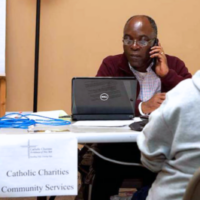The Fair Labor Standards Act (FLSA) promises hourly workers a minimum wage and time-and-a-half for all hours over 40 in a week. At least that’s what the history books and law texts say. In reality, the FLSA is riddled with exemptions that, for too many workers, make its protections meaningless. I know because I was once one of those workers.
When I was incarcerated, I was forced to work 34–40 hours per week against my will but was only paid 16 cents an hour. I could and was forced to work mandatory overtime for the same 16 cents an hour.
Why? Because the 13th Amendment to the United States Constitution has a loophole that allowed for—that created—forced labor through mass incarceration. The 13th Amendment made chattel slavery and involuntary servitude unconstitutional, yet it included an insidious exception: “Except as a punishment for a crime.” This simple exception means that instead of eliminating slavery, the 13th Amendment ironically extended it into perpetuity.
The 13th Amendment made chattel slavery and involuntary servitude unconstitutional, yet it included an insidious exception: “Except as a punishment for a crime.”
This means the incarcerated can be exploited for their labor while others turn a profit. For example, companies like Corcraft, an entity within the New York State Department of Corrections and Community Supervision, can get away with paying incarcerated people 16 cents an hour while making upwards of $53 million a year in revenue from incarcerated labor.
And we know who these people are, those who are being impacted and exploited. They are disproportionately Black and Latinx.
When I first stepped into Riverview State Correctional Facility in New York State after coming out of the Greene Correctional Solitary Confinement Box, I was required to work in the mess hall. I woke up at 5:30 a.m. to get an early start on preparing breakfast and lunch for 882 individuals. After my shift, I was exhausted and tired, and my feet were swollen. I remember going to the commissary to buy hygiene items like toothpaste and other necessities to live. But despite getting up at 5:30 a.m. to work and working 34–40 hours per week, I usually found that I had only four dollars in my account. I had to figure out which items I most needed, like toothpaste or a stamp so I could write to my loved one.
And what of the families of many of my fellow incarcerees who were deprived of a wage earner? Imagine how much better they could have fared were we paid a decent wage that could be sent home to support spouses, parents, and children?
Today, America has 1.8 million individuals incarcerated and 4.5 million people under some form of parole and probation. “More Black men are behind bars or under the watch of the criminal justice system than were enslaved in 1850,” according to Michelle Alexander, author of The New Jim Crow.
In New York City alone, the minimum wage starts at $15 an hour. In the rest of the state, it’s $13.20. In prison in New York State, the minimum wage is 16 cents per hour and hasn’t seen an increase since 1992, when the governor was Mario Cuomo. And just as prices have risen outside prison, commissary prices inside prison have skyrocketed.
It is long past time for this nation to truly eliminate forced labor and de facto slavery. Fortunately, the path toward doing so is simple: mandate that all incarcerated workers are fully covered by the FLSA, including the guarantee of the federal minimum wage and time-and-a-half for overtime.
Raising wages will ensure that people who are incarcerated are able to control their futures. They will be able to save money for their time beyond prison, which will, in turn, support their economic futures and their ability to reenter their communities and decrease their likelihood of returning to prison. When people come home from incarceration, there is no safety net to support their transition—even for the basics like food, toiletries, or transportation to job interviews. The money they earn in prison can help.
During the civil unrest of 2020, Confederate statues were removed across the country due to protests about the deaths of George Floyd and Breonna Taylor. But statues and slogans are not enough. Our policies must change to actually tackle the racial inequities those protests were about. It’s time for this country treat the incarcerated—who are disproportionately Black and Latinx—fairly.
Vidal Guzman is founder and executive director of America on Trial.
Read essays from workers and advocates whose direct experience with the FLSA’s shortcomings offers a starting point for discussion and action to change it:
Related to
The Latest News
All newsNELP Urges New York Governor Kathy Hochul to Delay Flawed Transition of Medicaid CDPAP Homecare Program to Avoid Harm to Clients and Workers

News Release
NELP Joins Amicus Brief in U.S. Supreme Court Religious Exemption from UI Case

Blog
Northwest Public Broadcasting: Striking Workers in Washington Could Get Access to Unemployment Claims If Bill Passes

Press Clips

